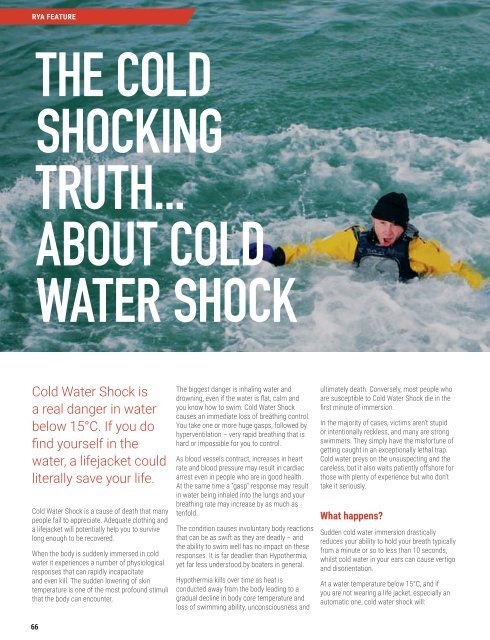You also want an ePaper? Increase the reach of your titles
YUMPU automatically turns print PDFs into web optimized ePapers that Google loves.
RYA FEATURE<br />
THE COLD<br />
SHOCKING<br />
TRUTH...<br />
ABOUT COLD<br />
WATER SHOCK<br />
Cold Water Shock is<br />
a real danger in water<br />
below 15°C. If you do<br />
find yourself in the<br />
water, a lifejacket could<br />
literally save your life.<br />
Cold Water Shock is a cause of death that many<br />
people fail to appreciate. Adequate clothing and<br />
a lifejacket will potentially help you to survive<br />
long enough to be recovered.<br />
When the body is suddenly immersed in cold<br />
water it experiences a number of physiological<br />
responses that can rapidly incapacitate<br />
and even kill. The sudden lowering of skin<br />
temperature is one of the most profound stimuli<br />
that the body can encounter.<br />
66<br />
The biggest danger is inhaling water and<br />
drowning, even if the water is flat, calm and<br />
you know how to swim. Cold Water Shock<br />
causes an immediate loss of breathing control.<br />
You take one or more huge gasps, followed by<br />
hyperventilation – very rapid breathing that is<br />
hard or impossible <strong>for</strong> you to control.<br />
As blood vessels contract, increases in heart<br />
rate and blood pressure may result in cardiac<br />
arrest even in people who are in good health.<br />
At the same time a “gasp” response may result<br />
in water being inhaled into the lungs and your<br />
breathing rate may increase by as much as<br />
tenfold.<br />
The condition causes involuntary body reactions<br />
that can be as swift as they are deadly – and<br />
the ability to swim well has no impact on these<br />
responses. It is far deadlier than Hypothermia,<br />
yet far less understood by boaters in general.<br />
Hypothermia kills over time as heat is<br />
conducted away from the body leading to a<br />
gradual decline in body core temperature and<br />
loss of swimming ability, unconsciousness and<br />
ultimately death. Conversely, most people who<br />
are susceptible to Cold Water Shock die in the<br />
first minute of immersion.<br />
In the majority of cases, victims aren’t stupid<br />
or intentionally reckless, and many are strong<br />
swimmers. They simply have the mis<strong>for</strong>tune of<br />
getting caught in an exceptionally lethal trap.<br />
Cold water preys on the unsuspecting and the<br />
careless, but it also waits patiently offshore <strong>for</strong><br />
those with plenty of experience but who don’t<br />
take it seriously.<br />
What happens?<br />
Sudden cold water immersion drastically<br />
reduces your ability to hold your breath typically<br />
from a minute or so to less than 10 seconds,<br />
whilst cold water in your ears can cause vertigo<br />
and disorientation.<br />
At a water temperature below 15°C, and if<br />
you are not wearing a life jacket, especially an<br />
automatic one, cold water shock will:







